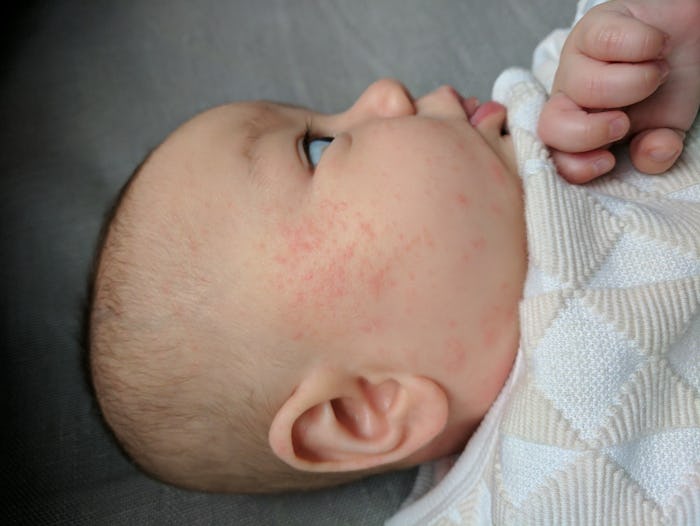Life

All Babies With Eczema *Need* This Crucial Step Added To Their Bathtime Routine
When your baby has an eczema flare-up, bathtime can feel super stressful. You don't want to do anything that will irritate that red, tender skin even more. So, how often should you bathe a baby with eczema, and what are the best products to use when that time comes? Really, it depends.
Eczema affects approximately 13 percent of children under the age of 18, according to Everyday Health. Since the condition can cause itchy, painful skin patches, you just might find yourself adopting a new catchphrase when the time comes to bathe your baby: "soak and smear." An article published in the Annals of Allergy, Asthma and Immunology (AAAI) looked at the risks and benefits of bathing a child with eczema frequently, and the findings were clear: A daily soak is acceptable as long as it's followed by an ample "smear" of moisturizer, according to Science Daily, reporting on the AAAI article.
The National Eczema Association (NEA) underscored the importance of daily bathing and moisturizing but referred to the therapeutic skin care routine as "soak and seal." Despite the slight variation in name, the reason behind this practice is the same: to give the dry skin associated with eczema the moisture it's lacking, according to the NEA.
Dr. Debra Jaliman, a dermatologist with a private practice in New York City, agrees that a daily bath for a baby with eczema is best. "Use lukewarm water instead of hot water. Use a soft towel and pat dry instead of rubbing the skin. Use a fragrance-free, very emollient cleanser. Always apply a fragrance-free hydrating moisturizer right after the bath to seal in the moisture. Use a humidifier in the room to keep the air hydrated," says Dr. Jaliman in an interview with Romper on the best practices when it comes to bathing a baby with eczema.
When practicing the "soak and smear" bath routine, you need to get right to the moisturizing post-bath, because timing is everything. "The smear part is really the most important element, because unless moisturizer is applied immediately, then the skin is likely to dry out even more," explained allergist Neal Jain, MD, American College of Allergy, Asthma and Immunology Fellow and co-author of the AAAI paper, in an interview with Science Daily.
However, if you're scratching your head at all of this advice because your pediatrician recommended the exact opposite (i.e. less bathing is better), there's a good reason for that, too. "[N]ot all eczema is the same. Some kids respond to 'wet' therapy and some respond to 'dry' therapy. Most families have to go through a trial and error process to determine what kind of care works best," explains Dr. Natasha Burgert, a pediatrician with a private practice in Kansas City, in an interview with Romper.
One thing that is uniformly agreed upon is that babies with eczema should have lotion applied to them immediately after a bath, whether it's once a couple times as week or daily. In terms of soaps, use only mild, unscented soaps or soapless cleaners for sensitive skin, according to WebMd. Another interesting thing to note is that while that natural or organic baby cleanser might seem like the most soothing choice for eczema, the opposite may be true. "People think about organic products as being healthy, but most kids are going to be sensitive to some extract, fragrance, or flowers," explained Nanette Silverberg, MD, director of pediatric dermatology at St. Luke's-Roosevelt Hospital Center in New York, in an interview with WebMD.
If your baby has severe eczema, Dr Jaliman adds that you'll want to use a prescription moisturizer or ones sold over-the-counter that are specifically made for eczema. "My pediatrician told me that we should specifically use a lotion that is advertised to treat eczema because regular petroleum-based products weren't working. We've been using this Aveeno eczema baby product ($12, Amazon) and it's definitely made a difference; that and very infrequent bathing, like once a week," explains Anne, a fellow mom who has been dealing with her baby's eczema since her newborn months, in an interview with Romper.
Last but not least, there's one more important activity to work into your baby's bath and bed routine: regular nail trimming. Babies with eczema can't help but scratch and that scratching can inflame the affected skin and lead to infection, according to Dr. Sears in Parenting. I personally like to cut my baby's nails right after bath, when she's calm, or when she's sleeping deeply.
Caring for a baby with severe eczema can be heart-wrenching, but the condition can be short-lived. It's estimated that two-thirds of children "outgrow" their eczema, according to the University of Iowa Stead Family Children's Hospital. Hopefully your kid falls within that statistic, and if not, no biggie — you and your child will figure out what's best to keep it in check when the time comes.
This article was originally published on